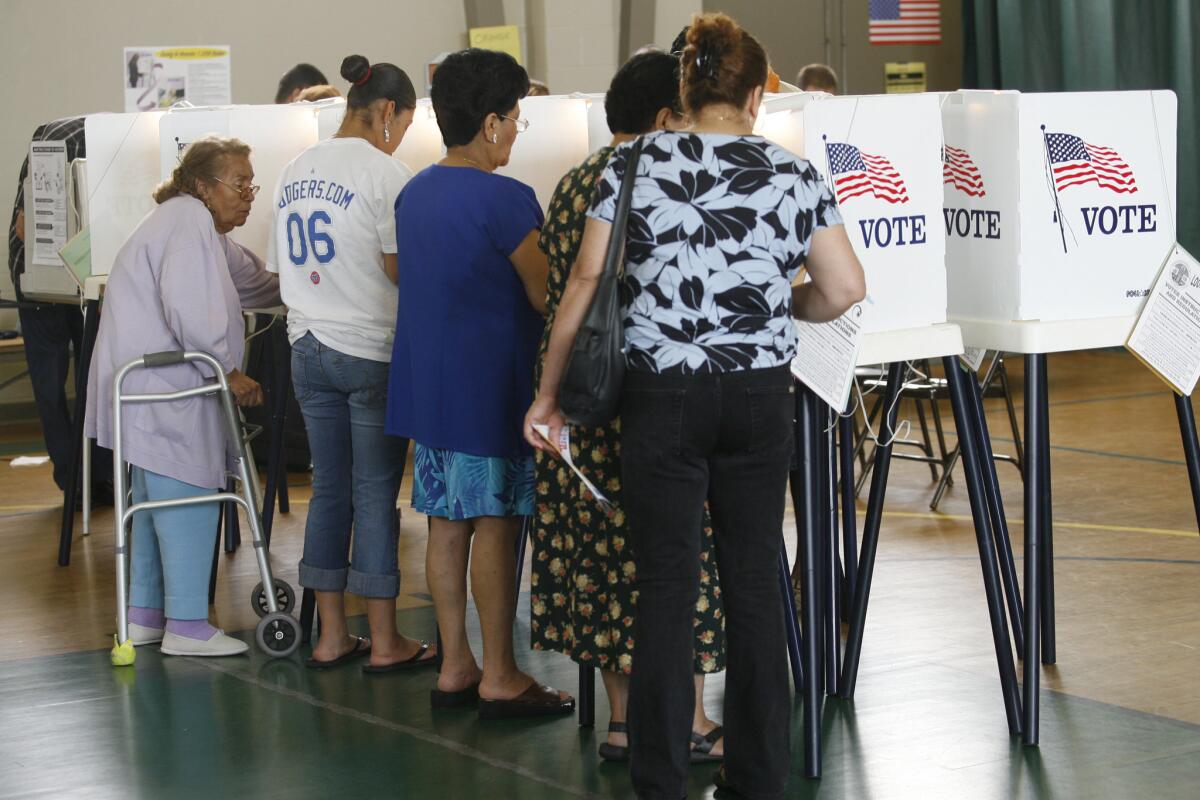Opinion: L.A. Ethics Commission suggests a new approach to buying votes

If only the Los Angeles Ethics Commission had the courage of its convictions.
As my colleague David Zahniser reported, the commission voted unanimously Thursday in favor of a new plan to goose voter turnout in Los Angeles, where 3 of 4 registered voters delegate the task of voting to their neighbors. Actually, thatâs on a good day. In the recent school board special election, 9 of 10 Angelenos left the voting to the little people.
The busy people here in Southern California have better things to do than pick a mayor or decide whether to require porn stars to wear condoms. To paraphrase Snoop â a true student of the Angeleno psyche â weâve got our mind on our money and our money on our mind.
Recognizing as much, the ethics watchdogsâ proposal calls for the city to set up a lottery for voters â letâs call it a Votto â so that the prospect of cash prizes will lure more people into the voting booth. The commission, which doesnât have the authority to implement the plan itself, left it up to the City Council to decide how many prizes to offer and how large they should be. It suggested that the council conduct a trial run to see what prize level might be effective.
âMaybe itâs $25,000, maybe itâs $50,000,â Zahniser quoted Commission President Nathan Hochman as saying. âThatâs where the pilot program comes in â to figure out what ... number and amount of prizes would actually get people to the voting box.â
I know what youâre thinking. In the old days, paying people to vote was illegal. In fact, it still is, depending on the context. But this is the Ethics Commission, so it knows where the lines are drawn, right?
(In case youâre wondering, election law attorney Betty Ann Downing of Long Beach advises that federal law makes it illegal to offer rewards for the act of voting. So the Votto would have to be confined to elections that donât include Congress or the White House. But thereâs no such prohibition in state law, as long as voters arenât rewarded for supporting a specific candidate or candidates.)
The commissionâs appeal to Angelenosâ venality is inspired, but I fear it doesnât go nearly far enough. The payoff it promises is far too small to draw a sniff from the cityâs professional class. Either the prize amount or the chance of winning would have to be considerably higher to prod those who make hundreds of dollars an hour to spend the time necessary to find the right polling place, obtain a ballot and mark their choices. The proposal shouldnât go forward until that problem is fixed. Otherwise, the only people whoâd vote would be the ones who need the prize money, in addition to the few idlers whoâve been voting in the pre-Votto elections.
(You may have noted that I didnât mention the time required to learn about the dozens of candidates and initiatives on the ballot. Thatâs because the few people who find such things interesting are already voting.)
Offering more or larger prizes wonât be cheap, and thatâs problematic. But there is an alternative. Many Angelenos, particularly in the aforementioned professional class, equate money with power. So rather than dangling cash in front of voters, how about giving the winners the power to cast the sole vote in the runoff of their choice? Kingmakers, baby!
Not only would that save money on prizes, it would drastically cut the cost of special elections. Think about the potential for cleaning up campaign finance. Instead of having to beg a bunch of lobbyists for more cash to finance yet another campaign, candidates could just spring for a nice dinner with a Votto winner.
The Times editorial board has wrung its collective hands about low voter turnout, but itâs proposed solutions â such as allowing people to register and vote on the same day â donât speak to the cynicism of Angeleno voters the way the Ethics Commissionâs proposal does. The commission says, in essence, we donât vote because we donât care, so letâs give people a reason to care.
Oh sure, you could argue that elections are already about votersâ pocketbooks. But rather than relying on people to see how Candidate X or Ballot Measure Y will cost them in terms of taxes, regulations and services, the commission wants to show Angelenos the money up front. They arenât showing enough money, but at least theyâre on the right track.
What, youâve got a better idea?
Follow Healeyâs intermittent Twitter feed: @jcahealey
More to Read
A cure for the common opinion
Get thought-provoking perspectives with our weekly newsletter.
You may occasionally receive promotional content from the Los Angeles Times.











